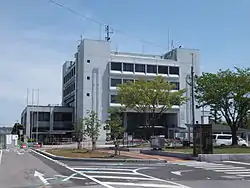Kōnosu
Kōnosu (鴻巣市, Kōnosu-shi) is a city located in Saitama Prefecture, Japan. As of 1 January 2021, the city had an estimated population of 117,995 in 50,801 households and a population density of 1700 persons per km².[1] The total area of the city is 67.44 square kilometres (26.04 square miles).
Kōnosu
鴻巣市 | |
|---|---|
 Kōnosu City Hall | |
 Flag | |
 Location of Kōnosu in Saitama Prefecture | |
 Kōnosu Location of Kōnosu in Saitama Prefecture | |
| Coordinates: 36°03′57.2″N 139°31′19.9″E | |
| Country | Japan |
| Region | Kantō |
| Prefecture | Saitama |
| Area | |
| • Total | 67.44 km2 (26.04 sq mi) |
| Population (January 2021) | |
| • Total | 117,995 |
| • Density | 1,700/km2 (4,500/sq mi) |
| Time zone | UTC+9 (Japan Standard Time) |
| – Tree | Zelkova serrata |
| – Flower | Pansy |
| Phone number | 048-541-1321 |
| Address | 1-1-1 Chuo, Kōnosu-shi, Saitama-ken 365-8601 |
| Website | Official website |
Geography
Located in east-central Saitama Prefecture, Kōnosu is on the central reaches of the Arakawa River, which flows through the west of the city, whereas the Motoara River flows from the southeastern to central portion.
Climate
Kōnosu has a Humid subtropical climate (Köppen Cfa) characterized by warm summers and cool winters with light to no snowfall. The average annual temperature in Kōnosu is 14.6 °C. The average annual rainfall is 1335 mm with September as the wettest month. The temperatures are highest on average in August, at around 26.6 °C, and lowest in January, at around 3.6 °C.[2]
Demographics
Per Japanese census data,[3] the population of Kōnosu has been decreasing slightly over the past 30 years.
| Year | Pop. | ±% |
|---|---|---|
| 1960 | 51,760 | — |
| 1970 | 66,318 | +28.1% |
| 1980 | 86,854 | +31.0% |
| 1990 | 107,124 | +23.3% |
| 2000 | 120,271 | +12.3% |
| 2010 | 119,629 | −0.5% |
History
In ancient times, the area around Kōnosu was the center of Musashi Province and there are many kofun burial mounds. The area was a favored falconry site by the Tokugawa shoguns during the Edo period and was also the location of Kōnosu-shuku, a post station on the Nakasendō highway.
The town of Kōnosu was created within Kitaadachi District, Saitama with the establishment of the modern municipalities system on April 1, 1889. On July 1, 1954, Kōnosu annexed the neighboring villages of Mida, Tamamiya, Mamuro and Kasahara (from Kitasaitama District). On September 30, 1954 Kōnosu annexed the village of Jōkō, and was elevated to city status. On October 1, 2005 the villages of Kawasato and Fukiage were also annexed.
Government
Kōnosu has a mayor-council form of government with a directly elected mayor and a unicameral city council of 26 members. Kōnosu contributes two members to the Saitama Prefectural Assembly. In terms of national politics, the city is divided between the Saitama 6th district and Saitama 12th district of the lower house of the Diet of Japan.
Economy
Plastics and electronic components manufacturing are the largest industries in Kōnosu. Flower gardening and rice cultivation are also popular, and Kōnosu is also the main production center for traditional dolls used in the Hinamatsuri festival. The city is also increasing becoming a commuter town for the Tokyo Metropolis.
Education
Kōnosu has 19 public elementary schools and eight public middle schools operated by the city government, and three public high schools operated by the Saitama Prefectural Board of Education. The prefecture also operates one special education school for the handicapped.
Previously the city housed a Brazilian school, Centro Educacional Canarinho.[4]
Transportation
Highway
Local attractions

Kōnosu earned the nickname "Doll Town" for its many "Hina Ningyō" (a type of Japanese doll) factories. Kōnosu is also called "Flower town". It has several flower markets, and many flowers purchased in Tokyo and throughout the Kantō region are grown in Kōnosu.
Festivals
- Sakura Matsuri
- Natsu Matsuri (Summer Festival)
- Ootori Matsuri (autumn)
- Ojuya (November 13 to November 15)
- Shishimai (August 18)
- Mato Matsuri (January 12)
Twin towns — sister cities
Noted people from Kōnosu
- Shōei, actor
- Kazuyuki Nakane, Politician
- Chō, voice actor
- Naomichi Marufuji, professional wrestler
- Susumu Takagi, Politician
- One (manga artist), Mangaká (brought up)
References
- "Kōnosu city official statistics" (PDF) (in Japanese). Japan.
- Kōnosu climate data
- Kōnosu population statistics
- "Escolas Brasileiras Homologadas no Japão" (Archive). Embassy of Brazil in Tokyo. February 7, 2008. Retrieved on October 13, 2015.
External links
| Wikimedia Commons has media related to Kōnosu, Saitama. |
- Official Website (in Japanese)
